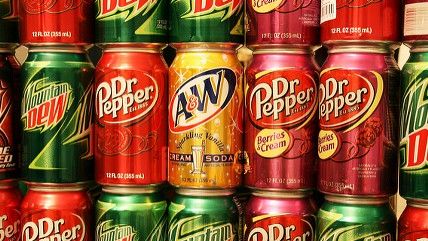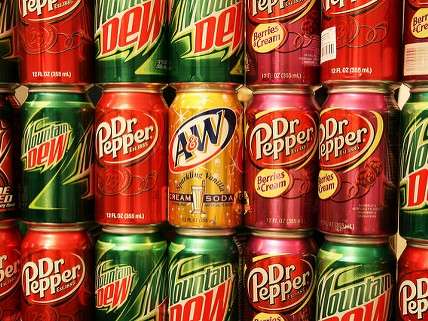Philadelphia's Soda Tax Is About Raising Revenue, Not Public Health
Mayor Jim Kenney freely admits it's a way for the city to make money.


New York Times health reporter Margot Sanger-Katz, who has cheer-leaded for increased taxes on soda for some time, published an article yesterday in praise of Philadelphia's "novel strategy" to promote its proposed (and likely to pass) measure increasing the price of sweetened drinks by one-and-a-half cents per ounce.
The game-changing strategy to sell a regressive tax that will disproportionately hit the pockets of the poor, as well as grant even more power to the government to regulate the personal choices of private citizens? Framing it as a revenue source, rather than as a do-gooder health measure.
While it is true that there is an obesity crisis in this country and high-calorie and sugary drinks certainly do play their part in expanding American waistlines (though that part is frequently overstated), like so many Nanny State initiatives, Philadelphia's proposed tax is confusingly inconsistent right out of the gate.
Sanger-Katz writes that to assuage the guilt of some members of the City Council that their tax will hurt lower income residents — because "Poor people tend to drink more sugary drinks than higher earners" — the measure also taxes sugar-free diet sodas (which are also frequently calorie-free), which "was an effort to spread the tax burden up the income scale."
The measure also exempts juice drinks, which naturally contain sugar, "as long as they have 50 percent juice, even if they also have added sugar." So essentially, the tax is based on the political preferences of the council members, not science.
In April, Philadelphia Mayor Jim Kenney's proposed soda tax became a bone of contention in the Democratic presidential primary race, when Sen. Bernie Sanders (D-Vt.) blasted his rival Hillary Clinton over her support of the measure. Sanders called it a "regressive tax" which violated Clinton's pledge to "not raise taxes on anyone making less than $250,000."
Other traditionally Democratic interests are also opposed to the tax, including the Teamsters union, whose International Vice President Bill Hamilton said at a rally in Philadelphia yesterday, "The issue has never been about health and we will all end up paying for this tax with the job losses that will occur if the mayor's soda tax is passed."
It should also be noted that Sanger-Katz mentioned Mexico's national soda tax in her article yesterday, crediting the tax with causing a "substantial" drop in the "consumption of sugary drinks" for the first year of its existence. What Sanger-Katz neglects to mention is that Mexican soda sales rebounded a year later.
How could this be? In an article last month, Reason contributor Baylen Linnekin explains:
Soda tax supporters appear flummoxed, but undaunted. Their argument: it was hot. Really. Since 2015 was warmer than 2014, tax supporters argue, that can help explain the increase in soda consumption in Mexico.
A few months earlier, Linnekin noted that one of the prominent studies touting the success of Mexico's soda tax, which was published in the British Medical Journal, "was funded by Bloomberg Philanthropies—which also provided $10 million to push Mexico to adopt the soda tax in the first place—and the Robert Wood Johnson Foundation, which supports soda taxes. And yes, Bloomberg Philanthropies is former New York City Mayor Mike Bloomberg's primary charity organization, whose stated mission is to "[create] lasting change" where "the greatest good can be achieved."
As mayor, Bloomberg was known for insinuating his personal health and diet preferences into policy, and his Nanny Statism did not cease when it came to charity. For example, he banned private food donations to homeless shelters because their salt content could not be verified. "The greatest good" apparently means less food for the hungry, just in case.
But like Philadephia's soda tax, the appearance of "the greatest good" is more important to elected officials than demonstrable results. But unlike Bloomberg's initiatives, the City of Brotherly Love will make some money on policing people's diets.
As Mayor Kenney's spokesman was quoted as saying in the Times' article, "It was always about the revenue."


Show Comments (117)